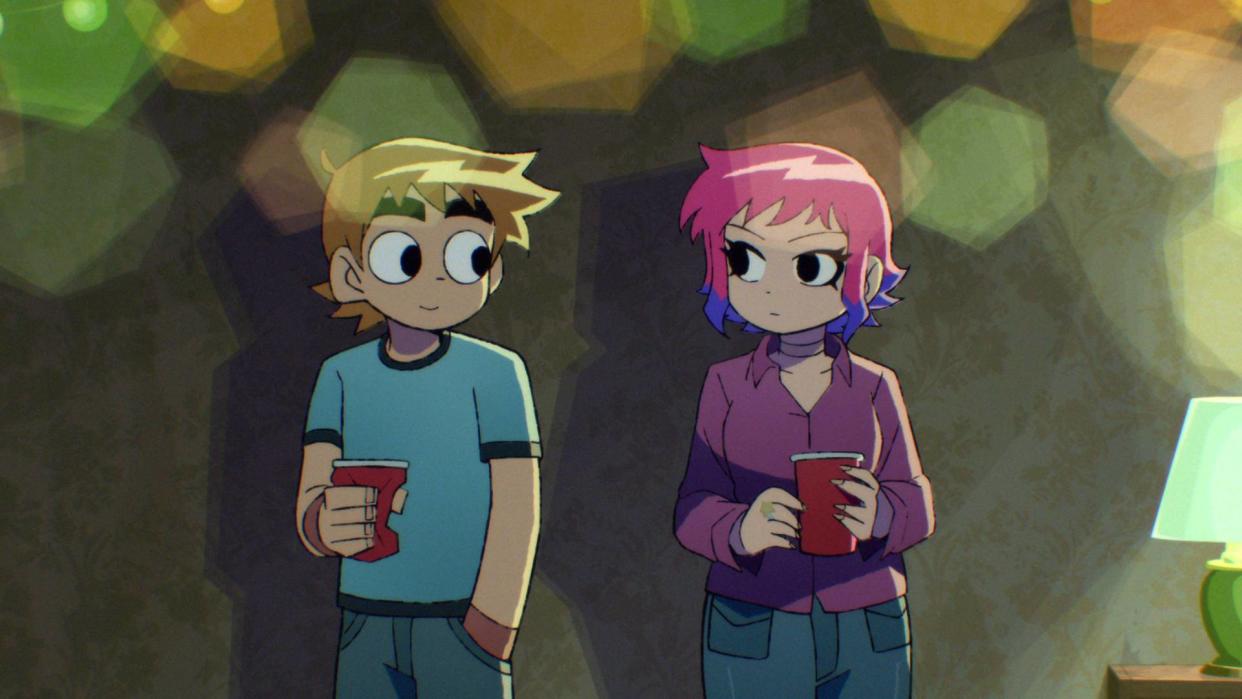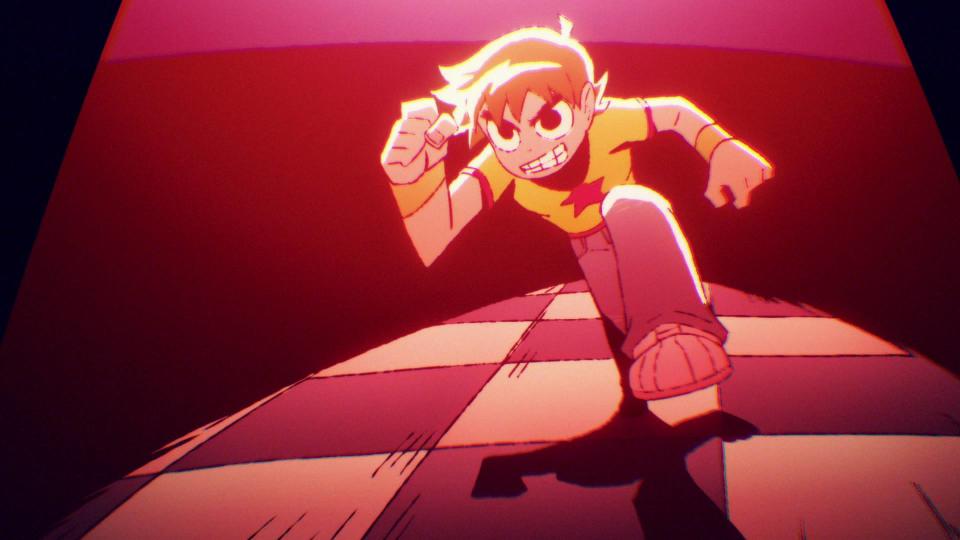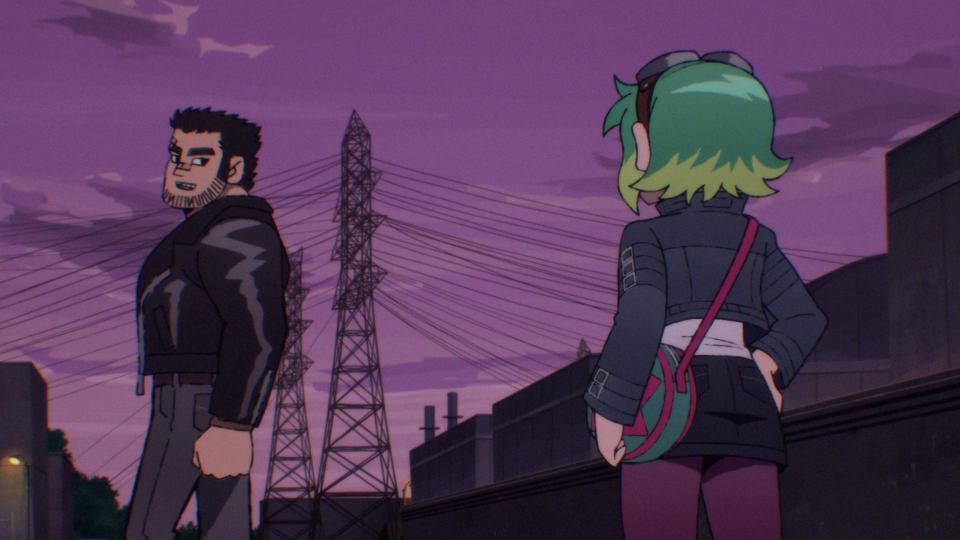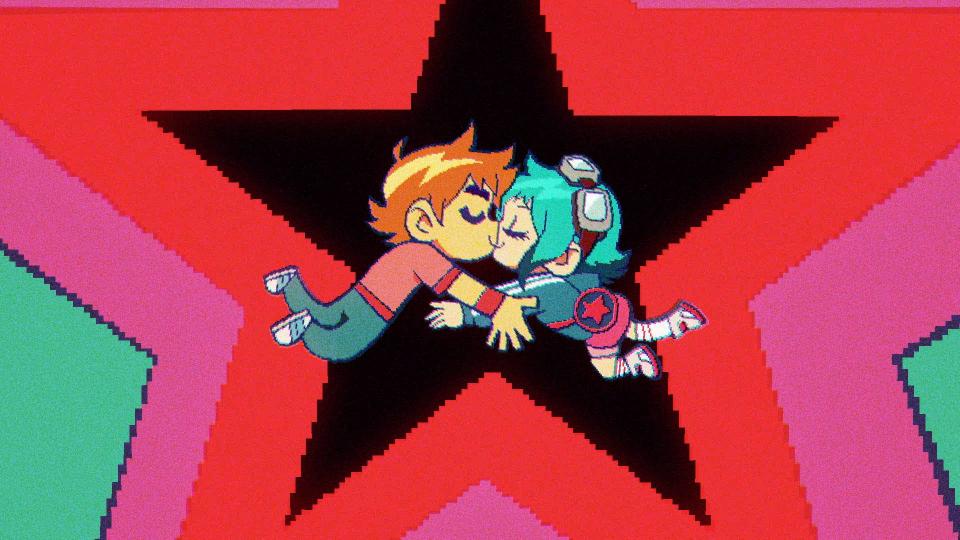Scott Pilgrim Takes Off review: "This Netflix anime feels like what Into the Spider-Verse was to Spider-Man"

When something has been done so well, multiple times, it’s a hard sell to justify a reboot. And for Scott Pilgrim, which has a beloved original comic, Edgar Wright’s cult-classic movie, and a game adaptation all under its belt, the sentiment has never been clearer.
But, luckily for audiences, it was a feeling shared by Scott Pilgrim Takes Off showrunner (and comic creator) Bryan Lee O'Malley, who, when he was first approached by Netflix to create an anime spin-off, rejected the idea. Not wanting to retread old ground, he told SFX magazine that it was only when he had the inspired idea to turn this beloved story on its head that he reneged on his position.
Thank goodness he did too, as this new show twists and turns the tale fans know so well into something decidedly fresh. It all makes for an eight-part anime that is nothing short of a meta triumph – and may just be a contender for this dorky slacker’s best adaptation yet.
Twisting tales

Now, let’s get this out of the way: I’m going to be side-stepping spoilers about exactly how O’Malley and co-showrunner BenDavid Grabinski (Are You Afraid of the Dark?) pull this off in this review. The surprises of the show are best enjoyed going in blind.
What I will say is that the series begins in very familiar territory. Scott (voiced again by live-action counterpart Michael Cera) is living in Toronto, dating teenager Knives Chau (Ellen Wong), and playing bass for his band Sex Bob-Omb. His status quo is thrown for a loop when he wakes up in his roommate Wallace Wells’ (Kieran Culkin) bed from a dream about a mysterious woman with two-colored hair.
After he becomes convinced that she’s the literal woman of his dreams, he meets her at a party where they hit it off. There’s just one big catch: those pesky seven evil exes he must defeat in order to date her. So far, so familiar. But then something big happens and throws this story in a new multiversal direction.
It’s all executed by the phenomenal Japanese animation studio, Science Saru, which is known for its style of meshing hand-drawn and digital animation. The approach works perfectly here, creating a bright and familiar look that feels ripped straight from a comic book.
On the macro level, it’s hugely enjoyable to get lost in, but it’s the small touches that really elevate the whole thing. From little arcade game title screens to breaking the fourth wall through side splits, it’s all been crafted with a huge amount of care.
That’s most obvious when they try their hand at different genres, crafting films within films, classic anime sequences, and game-style face-offs. The self-referential style of the animation is reflected in the script and story work too, with endless nods to the Scott Pilgrim universe, Wright’s (who’s on board as an executive producer) filmography, and pop culture in general.
Class casting

Much of its tongue-in-cheek energy comes from the returning cast too, all here to voice their beloved characters once again. Wright previously called casting his 2010 movie one of his proudest moments, and with them all back today, it’s easy to see why. Everyone does a great job, including Cera, Culkin, Brie Larson, and Aubrey Plaza.
However, it really excels when it starts broadening the characters’ stories. Chris Evans’ return to Hollywood legend Lucas Lee is a perfect example. The Marvel star has so much fun with O'Malley and Grabinski's brilliant, quick dialogue, bringing suave energy to the pretty tragic character, pulling off one of his funniest performances to date.
Then there’s the real star of the show, Mary Elizabeth Winstead. Title be damned, this series is Ramona Flowers’ story, and it’s all the better for it. There have been some surface changes to her tale, like swapping her Amazon deliveries for Netflix DVDs (cue the self-referential streaming jokes), but the biggest one comes from the expansion of the ex's backstories and, in turn, her past with them.
We see this depicted through flashbacks in each episode, bringing much-needed denouement and context. The result is a more fully developed Ramona Flowers, who’s seen less through the Manic Pixie Dream Girl eyes of Scott Pilgrim and is allowed to stand on her own.
Multiversal madness

The whole thing is accompanied by a stellar soundtrack, including some impeccable needle drops. Aside from its catchy opening theme by Necry Talkie, which you’ll be physically incapable of skipping, the standout tune is Liam Lynch’s 'United States of Whatever', which opens episode four in exhilarating form. Weaved into the story, animation, characters, and themes of the show, it’s an example of how much care has been taken to make the synergy work here.
The only slight consternation I have, then, is how fast it zips through it all narratively. The show’s relentless pace makes it built for multiple rewatches, and as much deep-diving into individual frames as you could want. However, that process can at times forget casual viewers, who may struggle, as I sometimes did, to keep up.
But as long as you’re strapped in, it’s a hell of a ride. This feels like what Into the Spider-Verse was to Spider-Man: a tongue-in-cheek reinvention of a beloved comic and film that brings its fans along with it.
With all of the ingredients the creators had, from a dedicated fanbase to the original returning cast, it would have been very easy to just recreate what’s come before. Instead, they’ve made the bold choice to push and pull this story to see how far it will stretch while never letting it snap out of shape. Scott Pilgrim wins once again.
Scott Pilgrim Takes Off is available to stream on Netflix now. For more check out our round up of the best new Netflix anime and the best anime series.
